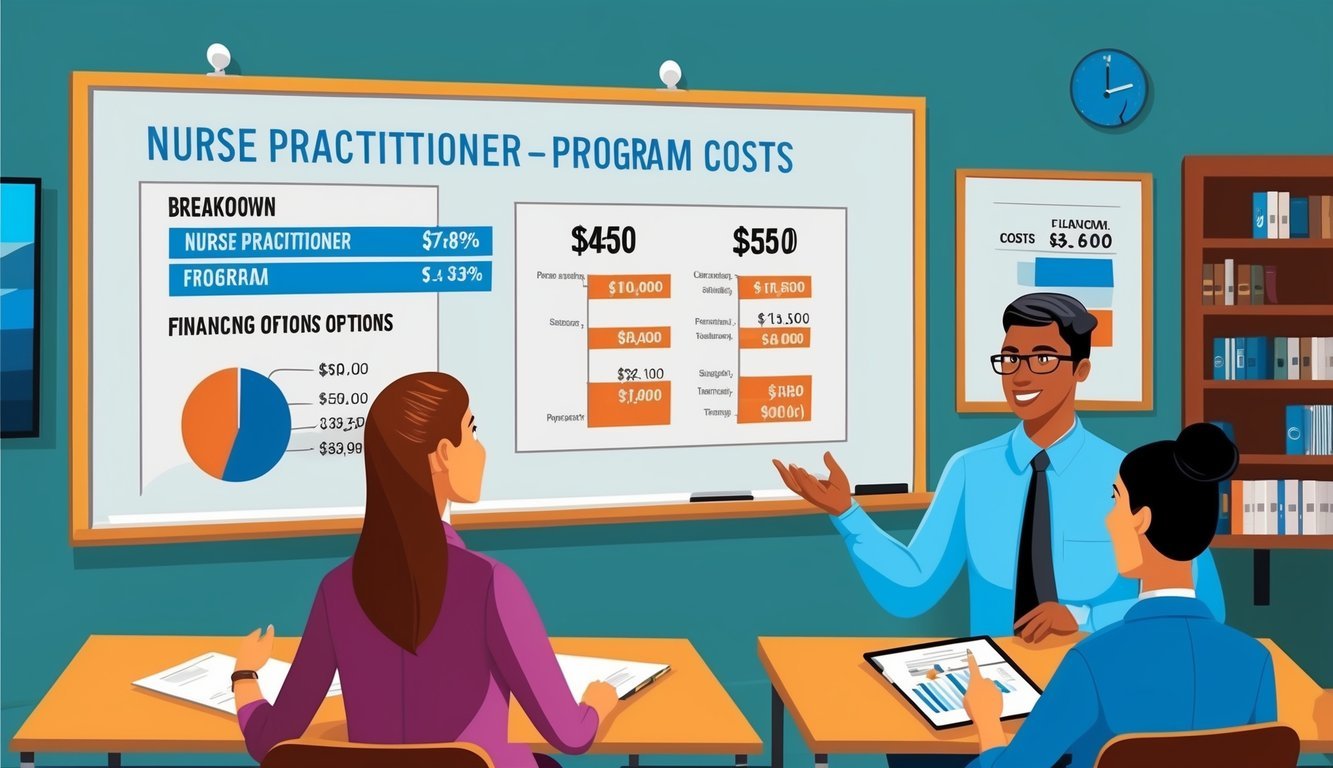Pursuing a career as a nurse practitioner (NP) can be a fulfilling choice that opens doors to advanced medical practice.
The cost of nurse practitioner school typically ranges from $66,000 to $89,000.
The amount varies depending on whether you are an in-state or out-of-state student.
Considering the long-term benefits such as job stability and potential earnings, understanding these financial commitments can help you prepare for this rewarding path.
Nurse practitioner programs often require a Bachelor of Science in Nursing (BSN).
They may also involve additional costs for study materials and clinical placements.
You’ll find that expenses vary widely based on the institution and location, as well as the type of NP degree you aim to achieve.
This could be a Master of Science in Nursing (MSN) or a Doctor of Nursing Practice (DNP).
With a high demand for qualified NPs in the healthcare industry, investing in your education can pay off significantly.
For further insights on specific programs and their costs, you can explore resources like NursingProcess.org to guide your decision-making process.
Understanding Nurse Practitioner Education
In pursuing a career as a nurse practitioner, you’ll encounter various educational paths and degree options.
These choices are vital for shaping your future role and responsibilities in healthcare.
Educational Pathways
To become a nurse practitioner, you typically begin as a registered nurse (RN).
This can be achieved through an Associate Degree in Nursing (ADN) or a Bachelor of Science in Nursing (BSN).
Once you hold your RN credentials, there are two primary pathways for advanced education:
- BSN to MSN: For those with a Bachelor of Science in Nursing, this route leads directly to a Master of Science in Nursing (MSN).
- RN to MSN: This pathway may allow RNs with an ADN to obtain an MSN through bridge programs.
These programs efficiently prepare you for nurse practitioner roles, usually taking 2-3 years.
Accreditation is crucial, so ensure your chosen program is recognized by relevant bodies to facilitate your future certification.
Degrees Explained: MSN vs. DNP
When considering advanced degrees, you can choose between a Master of Science in Nursing (MSN) and a Doctor of Nursing Practice (DNP).
- MSN: This degree provides comprehensive training in advanced nursing practices. It often focuses on clinical techniques, management skills, and tailored specialties.
- DNP: The Doctor of Nursing Practice is a terminal degree aimed at expanding your expertise in clinical leadership and evidence-based practice. The DNP programs typically involve more rigorous research components and prepare you for administrative roles.
The choice between MSN and DNP hinges on your career goals.
If your focus is on clinical practice, an MSN may suffice.
Conversely, a DNP is ideal if you aspire to leadership or policy-making roles in healthcare.
For more specific about educational requirements, programs, and costs, consider exploring the AANP resources.
Nurse Practitioner Specializations

Nurse practitioners (NPs) can choose from various specializations, each focusing on distinct patient needs.
Understanding these specializations helps you identify career paths that align with your interests and the healthcare demands you wish to address.
Family Nurse Practitioner
As a Family Nurse Practitioner (FNP), you provide comprehensive healthcare to patients of all ages, emphasizing primary care.
This role includes diagnosing illnesses, creating treatment plans, and conducting preventive care.
Typically, FNPs handle conditions like diabetes, hypertension, and routine health screenings.
The training involves coursework in family health, pediatrics, and gerontology, coupled with clinical rotations.
Many FNPs operate independent practices, allowing a high degree of autonomy.
This specialization prepares you to deliver continuous care, forming long-term patient relationships, which is essential in promoting wellness.
Pediatric and Neonatal Nurse Practitioner
In the role of a Pediatric Nurse Practitioner (PNP) or Neonatal Nurse Practitioner (NNP), you focus on the health needs of infants, children, and adolescents.
PNPs generally provide clinical care in outpatient settings, addressing common childhood illnesses and developmental assessments.
Meanwhile, NNPs work in critical care units, specializing in the treatment of premature and critically ill newborns.
Both paths require a strong foundation in pediatric clinical skills and knowledge of growth and development.
Training typically involves advanced pharmacology and specialty care.
These roles emphasize compassionate communication and family involvement, ensuring you are prepared to support both patients and their families.
Psychiatric-Mental Health Nurse Practitioner
As a Psychiatric-Mental Health Nurse Practitioner (PMHNP), you assess, diagnose, and treat mental health disorders, offering therapies and medications.
This specialization is crucial in addressing the rising need for mental health services in society.
Your training includes understanding psychiatric diagnoses, psychotherapy techniques, and pharmacology specific to mental health medications.
You will often work in various settings, including hospitals, outpatient clinics, and community health centers.
PMHNPs play a vital role in destigmatizing mental health issues while delivering holistic care, integrating psychological principles with physical health assessments.
Specialized Fields in Nurse Practitioner Care
Nurse practitioners can also choose specialized fields, such as acute care, women’s health, oncology, or dermatology.
Here are some notable specialties:
| Specialty | Focus Area |
|---|---|
| Acute Care Nurse Practitioner | Care for patients with complex, acute conditions |
| Women’s Health Nurse Practitioner | Women’s reproductive health and pregnancy care |
| Oncology Nurse Practitioner | Cancer care and support |
| Dermatology Nurse Practitioner | Skin-related issues and treatments |
| Urology Nurse Practitioner | Focus on urinary and reproductive systems |
| Gastroenterology Nurse Practitioner | Digestive system disorders and treatments |
These specializations require additional certification and training relevant to the specific field.
Pursuing a niche can enhance your skills and open up new opportunities in healthcare.
By understanding these roles, you can make informed decisions about your career as a nurse practitioner.
Clinical Training and Certification

For aspiring nurse practitioners, clinical training and certification are crucial steps in your education and career.
These elements ensure you acquire the necessary skills and credentials to provide quality healthcare.
Clinical Hour Requirements
A key component of your training involves completing a specific number of clinical hours.
Most nurse practitioner programs require you to complete between 500 to 1,000 clinical hours.
These hours are typically accrued during your coursework, allowing you to gain hands-on experience in various healthcare settings.
The clinical training often includes rotations in specialties such as pediatrics, adult medicine, and geriatrics.
This diverse experience is designed to prepare you for the different challenges you may face as a nurse practitioner.
It’s essential to confirm that your program meets the clinical hour standards set by accrediting bodies to ensure your eligibility for licensure and certification exams.
Programs accredited by organizations like the Commission on Collegiate Nursing Education (CCNE) or the Accreditation Commission for Education in Nursing (ACEN) are often recommended.
Certification and Licensure
After completing your educational and clinical training, you must obtain national certification to practice as a nurse practitioner.
Certification typically requires passing a national certification exam.
The two main certifying bodies in the United States are the American Nurses Credentialing Center (ANCC) and the American Academy of Nurse Practitioners Certification Board (AANPCB).
To be eligible for certification, you must hold an active registered nurse (RN) license and complete an accredited nurse practitioner program.
The certification exam tests your knowledge and clinical competencies relevant to your specialty area.
Upon passing the exam, you will be designated as an Advanced Practice Registered Nurse (APRN), allowing you to apply for state licensure.
Depending on the state, additional requirements may include continuing education and maintaining your certification through periodic renewal.
Be sure to check your state’s specific regulations to ensure compliance.
Cost and Financing of Nurse Practitioner Programs

Understanding the costs associated with nurse practitioner programs and the available financing options is crucial as you prepare for your advanced nursing career.
Tuition and Fees
Tuition costs for nurse practitioner programs vary widely based on location, institution type, and program format.
For instance, affordable online nurse practitioner programs can cost as little as $20,000 for a full course of study, while prestigious on-campus institutions may exceed $100,000.
Here’s a breakdown of approximate costs:
| Program Type | Estimated Cost |
|---|---|
| Affordable Online Programs | $20,000 – $32,000 |
| Public University Programs | $30,000 – $60,000 |
| Private University Programs | $60,000 – $100,000+ |
Additional costs may include fees for application, textbooks, and materials.
You may also need to consider costs for prerequisites, which may require adding extra semester hours.
Financial Aid and Scholarships
Various financial aid options are available to help fund your nurse practitioner education.
You can explore federal financial aid programs, which may include federal loans and grants.
Completing the Free Application for Federal Student Aid (FAFSA) is the first step to accessing these funds.
Additionally, numerous nursing scholarships exist specifically for aspiring nurse practitioners.
Some states offer loan repayment programs for those willing to work in high-need areas, incentivizing your career choice.
Research scholarships that cater to your specific school or local community, often requiring letters of recommendation or essays detailing your professional aspirations.
Utilizing these resources can significantly alleviate the financial burden of your nurse practitioner education.
For more information about scholarships, visit NursingProcess.org.
Employment Outlook and Salary

As you consider nurse practitioner school, understanding the employment outlook and salary expectations is essential.
The job market for nurse practitioners is promising, with significant growth anticipated in the coming years.
Salary trends also reflect the increasing demand for qualified professionals across various healthcare settings.
Job Market Projections
The U.S. Bureau of Labor Statistics (BLS) forecasts a 38% increase in nurse practitioner jobs from 2022 to 2032.
This growth is much faster than the average for other professions, indicating a strong demand for nurse practitioners in various settings.
| State | 2022 Employment | Projected Growth by 2032 |
|---|---|---|
| Alabama | 3,800 | +920 (24.21%) |
| Nationwide | 335,000 | +128,000 |
The healthcare sector continually expands, driven by an aging population and increasing focus on preventive care.
Nurse practitioners are critical in private practices, healthcare organizations, and home health services.
Salary Trends and Factors
According to the latest data, nurse practitioners have a median annual wage of $126,260 as of May 2023.
Salaries may vary based on factors such as experience, location, and the type of healthcare setting.
| Workplace Setting | Mean Annual Wage |
|---|---|
| Outpatient Care Centers | $139,860 |
| General Medical and Surgical Hospitals | $135,610 |
| Offices of Physicians | $122,780 |
| Offices of Other Health Practitioners | $121,250 |
The salary potential increases with specialization and experience, particularly in healthcare services that require advanced training.
Nurse practitioners often find opportunities for higher wages and job security as they gain experience and build reputations in their fields.
For more detailed statistics, consider visiting resources like Nurse.org or the BLS.

